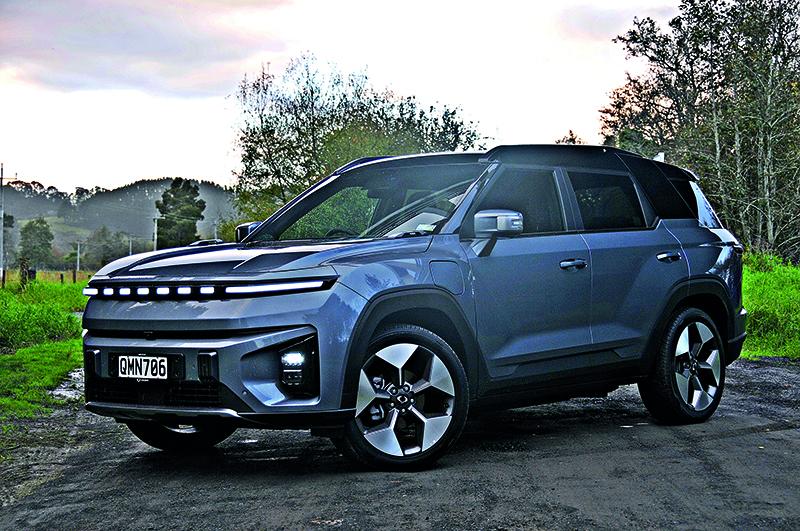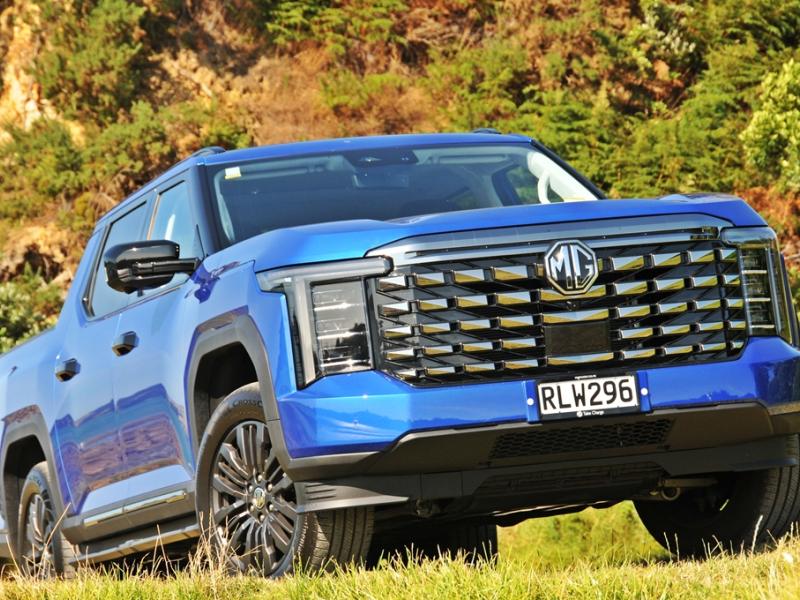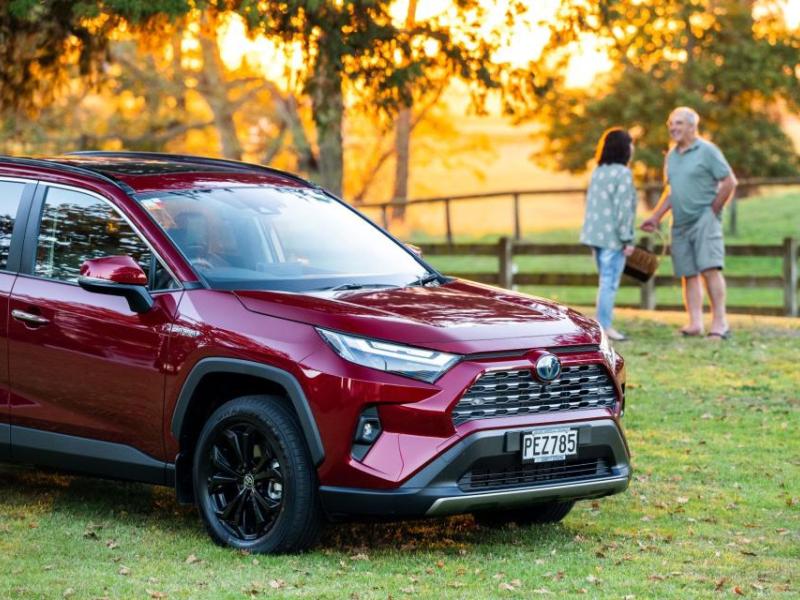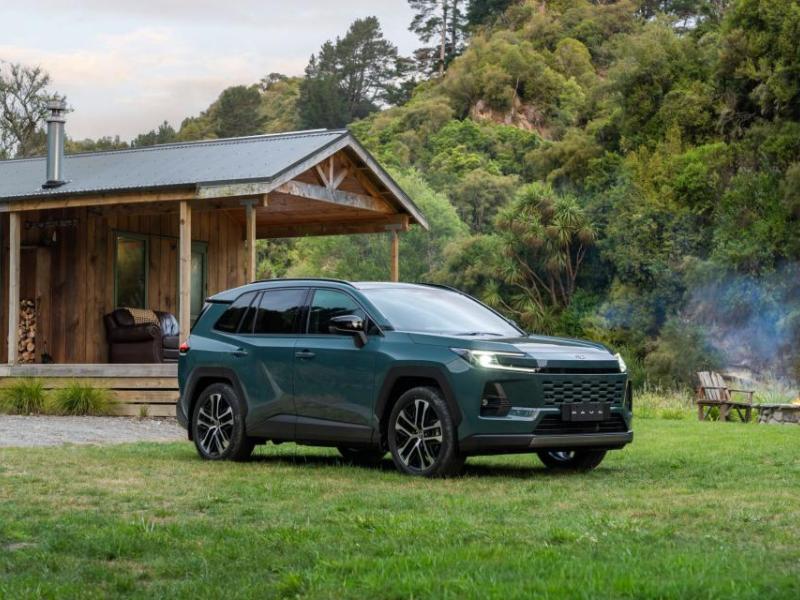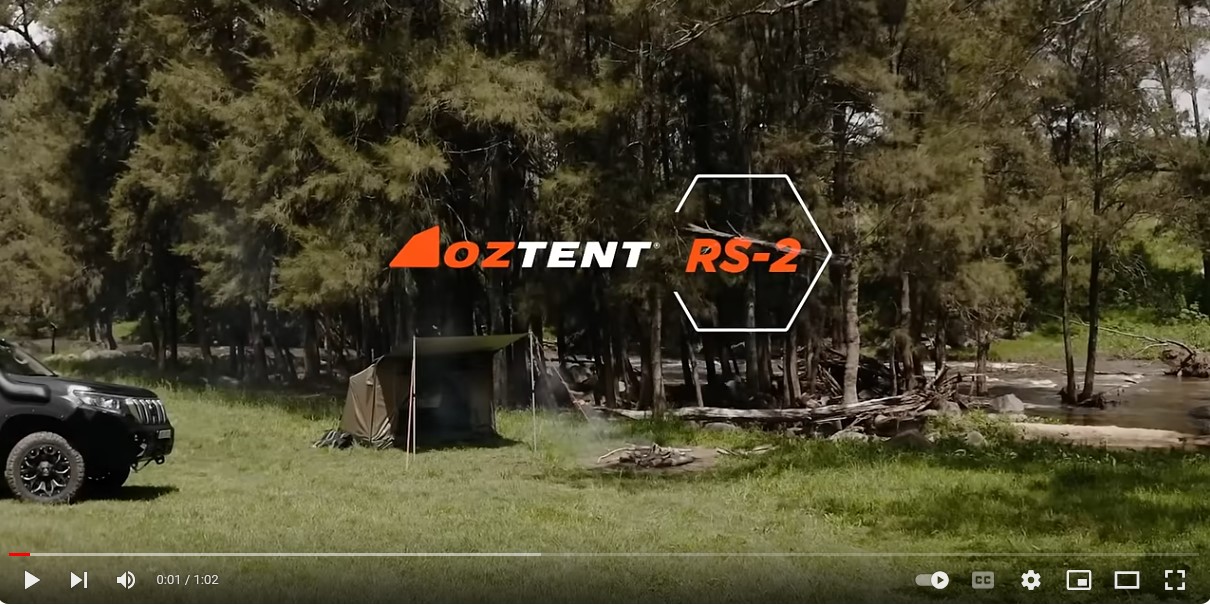This is not our usual stuff.
For starters, although it is an SUV, it’s distinctly urban.
The first full-electric SUV tested by NZ4WD is an unusual experience.
It’s very much the slick urban SUV, with street tyres and a huge array of tricky tech, much of which is more useful in the Auckland CBD than in the mud and rocks of the wild places we know and love.
It has a stunning interior, with its own light-based ‘effects’ on start-up and a beautiful curved infoscreen across half of the uncluttered dash. None of which has much to do with traditional offroad prowess.
And yet, this vehicle is most likely a clear snapshot of the future of 4WDs.
NZ4WD got in early: the EVX we picked up had just 80km on the clock, and tech details were pretty sparse. The website when we drove the car in May was a single page talking about the arrival of Torres in March.
We’ve always been early adopters.
KGM says the Torres “draws inspiration from the stunning landscapes of Torres del Paine National Park in Patagonia. Recognised as a UNESCO World Biosphere Reserve since 1978, this remarkable park is famed for its majestic mountains, glaciers, lakes, and rivers. Torres captures the essence of adventure, challenge, and escapism, reflecting the allure of its namesake.”
Okay.
Built on an entirely new platform, the all-new KGM Torres starts with a base version that uses fossil fuel. Its direct injection turbocharged engine and smooth transmission “deliver exceptional performance under real-world driving conditions”.
But ours is the full-electric version, the EVX, and it’s wildly different.
Representing a major departure from the outgoing Ssangyong brand’s traditional design, the Torres introduces a sleek and modern exterior that sets it apart within the company’s lineup and makes a clean break from Ssangyong products.
The exterior projects a rugged and tough aesthetic which is classic SUV, while the interior offers a delicate, comfortable, and contemporary space. The front showcases angled and elongated headlights, creating an eyecatching impression with a 3D headlamp effect.
The wide ‘radiator grille’ helps keep the Torres in touch with 100 years of car design, while thick ‘character lines’ on either side of the bonnet emphasise the muscular shape and fine detailing enhances the outdoor character.
The only quirk in the design language is a pair of handles on the bonnet which have no obvious purpose but – for some of us – evoke the airlift hooks on the bonnet of Humvees.
The EVX features 20” alloy wheels (diamond cut) with 245/45 tyres.
Angular wheel arches and low, straight character lines connect the front and rear and a distinctive metallic-look C-pillar and high gloss A-pillars add a luxurious finish. The rear design is traditional SUV, with a distinctive bump on the tailgate reminiscent of an integrated spare wheel cover though it does not hold any such component.
LED taillights and a skid plate on the rear bumper complete the visual identity.
Inside, there’s a clean and simple design ethos, and curved info screens that give a truly modern feel. Torres’s interior has been designed to maximise comfort and convenience for all onboard. That wide yet slim dashboard creates a spacious feel, providing an uninterrupted view of the road. Aside from being stylish, the four-spoke flat-bottom steering wheel offers integrated audio controls for quick access.
Metal accents and ambient mood lighting add a sophisticated touch to the upholstery.
Information is presented on a user-friendly, twin panoramic 12.3” digital display cluster and infotainment controls. In the way of all EV designs, Torres does things differently. In the case of the info displays, this means the readable surface is arranged in a graceful sweeping arc called a ‘hypervisor’. Standard features include Apple CarPlay, Android Auto, Bluetooth connectivity, DAB radio, and front USB-C and AUX ports, accompanied by six cabin speakers. There’s also a wireless phone charging pad.
The EVX has an eight-way power-adjustable driver’s seat and a six-way power-adjustable front passenger seat. All three models offer heated front seats for added comfort in colder conditions. The Torres EVX and Torres 4WD also have seat ventilation.
The rear seats are heated, there are dual USB-C charging ports and a mobile-phone pocket on each front seatback. The rear speakers can be muted on the infotainment screen if there are sleeping kids back there.
There’s a global debate at the moment about the use of touch controls versus traditional buttons, switches and knobs. Torres minimises physical controls, using its screens for almost all functions and emphasising clear communication, ease of operation, and convenience.
The most interesting members of the Torres family are the Torres 4WD at $54,990 and the KGM Torres EVX at an introductory price of $67,990. The EVX comes in head-to-head with its Tesla rival, the Model Y, though it is far more capable.
With a width of 1,890mm, Torres offers decent passenger space.
The EVX has a smart tailgate system for drivers with their hands full. When the key holder stands behind the tailgate for a few seconds (provided this feature is activated), the tailgate opens automatically.
The array of cameras and sensors ensure tight spaces are safely traversed.
The load area ranges from 839 to 1,662 litres depending on seats being up or stowed.
The Torres EVX is powered by a 73.4kWh battery and has 152kW of power and 339Nm of torque. Battery range is always going to be front-of-mind for any EV owner, but the dash display shows more than 400km range when fully charged.
Going easy on the accessories will squeeze out power at a slower rate. Claimed range in the city is a whopping 635km. Regenerative braking is multi-level and tops up the battery when the accelerator is eased off.
One thing to watch, though, is that the indicated range is not ‘actual’, instead it gives an expected range at the vehicle’s current state. Get more into the accelerator or meet a long uphill section of road and the range figure drops more quickly.
Anyone who has driven an EV, hybrid or PHEV will know the slightly strange moment when the accelerator is pressed and the vehicle move off, unaccompanied by any engine noise.
The same happens here. Torres’ interior noise is minimised by using sound-absorbing materials and foam pads in particular areas of the car’s body. During construction, structural adhesives are used to reduce interior noise and vibration, thereby ensuring comfortable driving and easy communication between those in the cabin.
What that does draw attention to is the noise generated by our coarse chip tarmac roads.
Driving: it’s a big SUV but not in any way difficult to manoeuvre in country or city. The instant torque of the electric motor means it’s easy to chirp the tyres from a standing start, and the power and torque when underway are class-competitive though not a stand-out feature of the experience. The battery being set low down means the EVX drives well and corners well. It does drop into road humps and hollows a bit, betraying the weight of that battery.
The Torres EVX has a maximum towing capacity of 1,500kg with a braked trailer, and 500kg for an unbraked trailer.
The EVX also features V2L (vehicle-to-load) charging capabilities, so its battery pack can be used to power appliances at the beach or campsite.
KGM says the Torres can climb a 28.03-degree incline.
It has a fording depth of up to 300mm at a speed of 30km/h. That’s not quite what a Ford Explorer or VW Amarok will wade through but is acceptable for a ‘mostly urban’ SUV.
Approach and departure angles are well shy of many SUV rivals, reflecting its urban purpose, though the BYD Blade battery and absence of a front-rear driveshaft keep the ramp-over angle respectable.
KGM claims that the Torres EV’s 0-100km/h is in the region of 8.1 seconds, comparable to many other EVs in its class.
As an aside, the petrol hybrid 4WD Torres has an enormous array of active safety features including eight airbags, autonomous emergency braking, lane departure warning, lane keeping assist, forward collision warning, and one system that will be a boon for those who get distracted at traffic lights: front vehicle start alert (FVSA), which notifies the driver when the vehicle in front is moving away. Now we only need a system that notifies drivers at the front of the queue when the light turns green.
Intelligent Adaptive Cruise Control is available in all three models and maintains a safe distance between the Torres and the vehicle in front by managing acceleration, deceleration, stopping, and starting – all based on the speed set by the driver.
It also keeps the vehicle in its lane by employing state-of-the-art driving assistance systems mentioned above.
The Torres EVX adds rear cross traffic collision assist that works when an approaching vehicle is detected while reversing; blind spot assist which automatically applies the brakes when a vehicle approaches from the rear while leaving a parallel parking place; safe exit warning system and tyre pressure monitoring, which is now mandatory on new vehicles in big markets like the USA.
Let’s be clear though: right now, the petrol hybrid AWD Torres is the pick of the range; the EVX is single-motor FWD only. It’s slick and sleek and drives well. It’s a great ambassador for the Torres range. It’s just missing that extra bit of capability that comes with all four wheels doing the driving. We’re looking forward to the AWD version when it becomes available for a test.
So, very urban in its focus and intent, but pure SUV in its capability. Zoom down to the snow for a weekend? Sure. Icy roads on the way? Not too much of a problem. Gritty roads up to the snow? Okay, maybe grab the shuttle.

